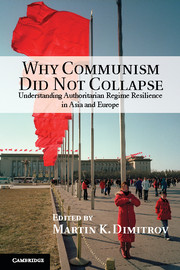Book contents
- Frontmatter
- Contents
- Tables and Figures
- List of Contributors
- Acknowledgments
- Abbreviations
- Part I Reform and Resilience
- Part II Ideology and Resilience
- Part III Contagion and Resilience
- Part IV Inclusion and Resilience
- 7 Authoritarian Survival, Resilience, and the Selectorate Theory
- 8 Cause or Consequence?
- Part V Accountability and Resilience
- Miscellaneous Bibliography
- General Bibliography
- Index
- References
7 - Authoritarian Survival, Resilience, and the Selectorate Theory
Published online by Cambridge University Press: 05 August 2013
- Frontmatter
- Contents
- Tables and Figures
- List of Contributors
- Acknowledgments
- Abbreviations
- Part I Reform and Resilience
- Part II Ideology and Resilience
- Part III Contagion and Resilience
- Part IV Inclusion and Resilience
- 7 Authoritarian Survival, Resilience, and the Selectorate Theory
- 8 Cause or Consequence?
- Part V Accountability and Resilience
- Miscellaneous Bibliography
- General Bibliography
- Index
- References
Summary
In this chapter, we delve into two of the key questions that Dimitrov (Chapter 1) argues are central to a theory of communist resilience. First, what is the basis of the rule of communist regimes, and how does it change over time? Second, why do some regimes collapse while others survive? As a framework for this analysis, we draw upon the selectorate theory as set forward in the Logic of Political Survival (LPS) by Bueno de Mesquita et al. and later amended by Bueno de Mesquita and Smith. This theory is presented as a parsimonious explanation for the survival of rulers, authoritarian and otherwise, based on key characteristics of a country’s institutions for selecting a ruler. As such, it is a useful point of reference for evaluating many of the arguments raised in this volume. If the theory’s predictions are accurate, a more narrow theory of communist resilience is unnecessary. We find, however, that the theory cannot explain the divergent outcomes of communist regimes.
The crux of the matter is that the selectorate theory predicts that outcomes in communist countries should resemble the outcome in North Korea: highly repressive rule by a narrow elite, unaccountable to the mass of citizens and offering little improvement in general welfare. The theory is thus unable to provide an adequate explanation for authoritarian rulers who mix political repression and growth-generating public goods, producing resilient authoritarian regimes buttressed by robust economic performance. Two of the five surviving communist regimes, China and Vietnam, fit this description, and the Lao People’s Revolutionary Party appears intent upon pursuing a similar strategy.
- Type
- Chapter
- Information
- Why Communism Did Not CollapseUnderstanding Authoritarian Regime Resilience in Asia and Europe, pp. 185 - 204Publisher: Cambridge University PressPrint publication year: 2013
References
- 17
- Cited by



